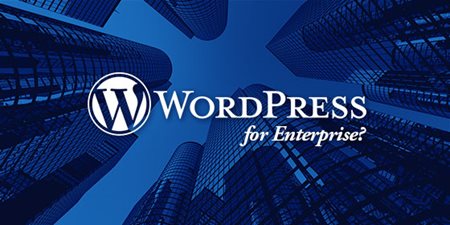Is WordPress a Good Enterprise Level CMS Solution?
By Jeremy Estey
April 11, 2019
CMS, content management, Content Management System, Enterprise, Enterprise Content Management, Headless, Headless CMS, Integration, security, Web Content Management, WordPress
Statistics suggest that WordPress powers 30% of all websites on the internet. The latest numbers reveal that the total number of websites online today is roughly 1.8 billion. That means that an average of  540,000,000 websites is using WordPress. This article will explore WordPress’s suitability for enterprise-level organizations.
540,000,000 websites is using WordPress. This article will explore WordPress’s suitability for enterprise-level organizations.
A common question about WordPress is its ability to power enterprise-level organizations. Is this open-source content management system (CMS) platform capable of taking on such a heavy workload? My response is always “yes” and “no”. It comes down to what an organization is looking to do and defining what they are offering to decide if WordPress will fully enable them to execute their objectives without much alteration.
WordPress — "To Use or Not to Use, That is the Question"
Let’s start by looking at why a company might want to use WordPress for the enterprise space. At its core, WordPress is a blogging platform that is designed to make the process of publishing content an uncomplicated one. Many enterprise companies are using WordPress for their CMS solutions. Some of the more recognizable names are:
-
CNN
-
TechCrunch
-
CBS
-
Reuters News
-
Forbes
-
UPS
Do you see a common theme from the above list? All of the companies listed, except for UPS, are media outlets. Their business is publishing and distributing content. Using WordPress in the enterprise space—if you’re a media outlet—makes sense, and if your business is content delivery, then WordPress may be the best solution for this. On the flip-side, WordPress does have its limitations, especially if you're looking to scale, but we'll look more at that later.
What Makes WordPress Great?
Plugins
WordPress has an estimated database of 50,000 plugins. Plugins make it simple to add functionality to your WordPress website. As the name suggests, it’s pretty much “plug and play”. All you need to do is download the plugin and activate it. The plugin usually walks you through a step-by-step process for configuring it to your website.
From a development standpoint, this ease of implementation makes sense since it removes the complexities of having to develop specific functionality. With so many plugins on the market, you can find one for virtually anything. Plugins add versatility to a website which is one of the reasons that WordPress is so popular and easy to use.
From an enterprise-level, these plugins may also hinder organizations using WordPress. More about that later.
Integration
One thing WordPress does well is integration. In fact, it’s up there with some of the top enterprise-level CMS platforms. Integrating applications and application program interfaces (APIs) into WordPress is not overly demanding. Companies using business-critical applications to run their business can find value in using WordPress for this reason. With so many plugins to choose from, rarely will you come across an application that isn’t supported by a plugin.
Conversely, implementing applications into other content management systems can be frustrating. At times, it can prove to be an intensively hands-on and time-consuming process. Furthermore, you’ll also have to update the application manually as the website evolves.
Anyone can use it
Straight-up, WordPress is easy to use. It brings an abundance of options to the table for organizations with a high demand for published content. With its accessibility, nearly anyone can understand it, regardless of their tech knowledge. It is a perfect tool for a company that is wanting to save money from having to train their employees on a complicated CMS. Additionally, with the launch of the new Gutenberg block editor, working with WordPress is more effortless than ever.
Headless capabilities
Out-of-the-box, WordPress doesn’t have “headless” capabilities which make it challenging for organizations who have a sophisticated online eco-system. In order to keep up with technology, organizations need to adapt, and without a headless CMS solution, it's difficult to scale.
Traditional CMS systems were initially designed strictly for websites, but as technology evolves, companies require more complex distribution channels (Virtual reality [VR], wearable devices, Internet of Things [IoT], etc.). A headless CMS will allow companies to develop applications for these devices by deploying APIs.
WordPress's answer to headless CMS is Representational State Transfer (REST) API, and it allows developers to deploy content through WordPress using many different technology channels in the same way a traditional enterprise-level CMS does.
Why WordPress May Not be a Good Choice for Enterprise
Security
WordPress may not be for enterprise-level organizations because of security concerns. It's a popular target for cyber-attacks, and being an open source platform, anyone can develop a plugin or theme for WordPress. Let's look at a plugin for example. Without proper testing, a plugin could have a backdoor somewhere in the code which makes it vulnerable for an attacker to expose the error and get into the website.
Proper investment in resources as well as hiring a knowledgeable team to update and maintain everything regularly will keep things secure. If an organization isn’t willing to be vigilant and invest heavily in that area, WordPress is not the right CMS for them.
Scalability
Going back to the headless CMS topic once again, WordPress, out-of-the-box, is hard to scale. Despite the fact that implementing the REST API makes it scalable, WordPress just isn’t designed to be an enterprise CMS, and as such, has its limitations for that level of complexity.
When a WordPress website scales, there are a lot of moving parts which makes it tough to manage and can end up causing all types of issues that require a lot of resources. When you're working with so many different plugins, sometimes it's hard to get them to work together. If one thing goes down, that could lead to the whole site being down.
You’re on Your Own
A downside to WordPress being open-source is that there is no dedicated support. Enterprise-level platforms that are not open-source will give you the assistance you need, anytime you need it. This provides an organization with the peace of mind and the confidence to scale while not having to worry about issues that may be detrimental to their business.
What do you do if WordPress goes down in the middle of the night and it affects millions of customers? With no support, it's going to be a long and arduous process to troubleshoot the primary cause. With a dedicated support team at your fingertips, complicated issues get dealt with quickly, and it could be the difference between making money or losing money.
Conclusion
At the enterprise-level, things can get complicated. A CMS that is a cinch to use is worth its weight in gold, but how do you determine what the best option is for your company? From the conversations I've had with clients, it comes down to one basic requirement; make things easier and more efficient. What is going to make things manageable for the company so that it can focus on what's important? If you have a platform in place that results in everyone having a smoother and more productive workday, then you've won the CMS game.

Jeremy Estey
Jeremy is the Co-founder of AmberSky Studios; a web design and development agency focused on exceptional customer service and exceeding expectations while implementing sound project management processes.